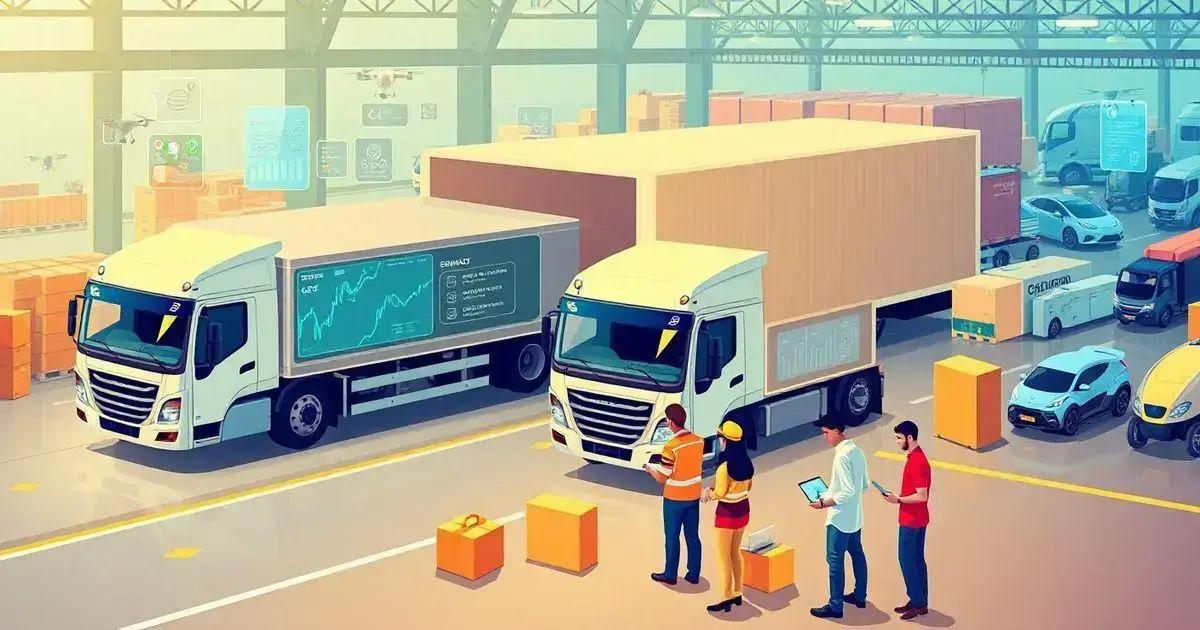6 Fleet Management Technologies to Boost Efficiency Leave a comment
Fleet management technology is vital for enhancing operational efficiency, safety, and cost-effectiveness in logistics, featuring real-time monitoring for immediate issue response, advanced software for route planning and predictive maintenance, process automation to reduce manual tasks, and strategies for cost reduction through fuel optimization and data analysis, all of which are essential for companies to remain competitive and achieve long-term success.
Fleet management technology has revolutionized how companies in the logistics sector conduct their businesses, especially when it comes to daily challenges. With tools that improve vehicle and employee management, companies can enhance their services qualitatively. In a competitive market like logistics and transportation, utilizing fleet management technology is a crucial strategy to increase competitiveness against rivals.
Real-Time Monitoring
Real-time monitoring is a game changer in fleet management. With this technology, fleet managers can track the exact location of their vehicles at any moment. Not only does this provide peace of mind, but it also allows for immediate responses to any issues that may arise on the road.
For instance, if a vehicle deviates from its planned route, managers can quickly identify the problem and intervene. This capability helps in reducing the chances of theft or unauthorized use of vehicles. Additionally, real-time data collection on vehicle speed, fuel consumption, and driver behavior provides valuable insights that can lead to better decision-making.
Moreover, real-time monitoring enhances safety. By knowing where each vehicle is, fleet managers can ensure that drivers are adhering to safety protocols and regulations. If a driver is speeding or driving erratically, alerts can be sent out immediately, allowing for proactive measures to prevent accidents.
In conclusion, investing in real-time monitoring technology not only boosts operational efficiency but also significantly improves safety standards within the fleet. This technology is essential for any company looking to optimize its fleet management practices.

Fleet Management Optimization
Fleet management optimization is all about making the most of your resources to ensure efficient operations. This involves using advanced software and tools that streamline various aspects of fleet management, from scheduling to maintenance.
One of the key components of optimization is route planning. By utilizing sophisticated algorithms and real-time traffic data, fleet managers can create the most efficient routes for their drivers. This not only saves time but also reduces fuel consumption and operational costs. For example, a delivery company that implements route optimization can see a significant decrease in fuel expenses, leading to higher profit margins.
Additionally, fleet management optimization incorporates predictive maintenance. By analyzing data from vehicles, managers can foresee potential issues before they become serious problems. This proactive approach minimizes downtime and repair costs, ensuring that vehicles are always in top condition and ready to hit the road.
Moreover, optimizing fleet management improves overall productivity. With better planning and resource allocation, companies can handle more deliveries or services within the same timeframe. This efficiency can lead to increased customer satisfaction, as timely deliveries enhance the company’s reputation.
In summary, fleet management optimization is crucial for companies wanting to maximize efficiency and minimize costs. By leveraging technology and data analytics, businesses can ensure their fleets operate smoothly and effectively, ultimately driving growth and success.
Process Automation
Process automation in fleet management refers to the use of technology to streamline and automate various operational tasks, significantly reducing manual work and the potential for human error. This is particularly beneficial in managing the complexities of fleet operations.
One of the most impactful areas for automation is route programming. Automated systems can calculate the best routes based on traffic patterns, delivery windows, and vehicle availability. This not only saves time but also enhances the efficiency of deliveries, ensuring that drivers spend less time on the road and more time completing their tasks.
Additionally, automation plays a crucial role in managing vehicle maintenance. Automated reminders can be set for regular maintenance checks based on mileage or time intervals. This proactive approach helps in preventing breakdowns and extending the lifespan of vehicles, leading to significant cost savings in the long run.
Moreover, automating administrative tasks such as invoicing, reporting, and compliance documentation frees up valuable time for fleet managers. Instead of spending hours on paperwork, they can focus on strategic decisions that drive business growth. For instance, automated reporting tools can generate insights into fuel consumption, driver performance, and operational costs, enabling managers to make informed decisions quickly.
In conclusion, process automation is a vital component of modern fleet management. By embracing automation, companies can improve operational efficiency, reduce costs, and enhance overall productivity, ultimately leading to a more competitive edge in the market.

Cost Reduction Strategies
Cost reduction strategies in fleet management are essential for maximizing profitability while maintaining service quality. By implementing effective measures, companies can significantly lower their operational costs without sacrificing performance.
One of the primary strategies for cost reduction is optimizing fuel consumption. Utilizing telematics and GPS tracking systems allows fleet managers to monitor fuel usage in real-time. By analyzing this data, they can identify patterns and make informed decisions, such as adjusting routes or reducing idling time, which directly impacts fuel expenses.
Another effective strategy is maintaining a regular maintenance schedule for vehicles. Preventive maintenance helps in identifying potential issues before they escalate into costly repairs. By keeping vehicles in optimal condition, companies can avoid unexpected breakdowns that lead to downtime and increased repair costs.
Additionally, training drivers on safe and efficient driving practices can lead to significant savings. Educating drivers about the importance of smooth acceleration, maintaining speed limits, and avoiding harsh braking can improve fuel efficiency and reduce wear and tear on vehicles. This not only cuts costs but also enhances safety on the road.
Furthermore, leveraging technology for automated reporting can help in identifying unnecessary expenses. By regularly reviewing operational costs, such as maintenance, fuel, and labor, fleet managers can pinpoint areas where savings can be made. For instance, if a particular vehicle consistently incurs high maintenance costs, it may be time to consider replacing it.
In summary, implementing cost reduction strategies in fleet management not only enhances profitability but also contributes to more sustainable operations. By focusing on fuel efficiency, preventive maintenance, driver training, and data analysis, companies can create a more cost-effective fleet management system that drives long-term success.
Conclusion
In conclusion, the integration of technology into fleet management is not just a trend; it’s a necessity for companies looking to thrive in a competitive market. From real-time monitoring that enhances safety and efficiency to optimization strategies that streamline operations, each technological advancement brings significant benefits.
Process automation further reduces manual workloads, allowing fleet managers to focus on strategic decisions that drive growth. Moreover, implementing cost reduction strategies ensures that companies can maintain profitability while providing high-quality services.
As the logistics and transportation industry continues to evolve, embracing these technologies will be crucial for businesses aiming to enhance their operational efficiency, reduce costs, and ultimately achieve long-term success.
FAQ – Frequently Asked Questions about Fleet Management Technologies
What are the benefits of real-time monitoring in fleet management?
Real-time monitoring allows fleet managers to track vehicle locations, speeds, and behaviors, enhancing safety and enabling quick responses to any issues.
How does fleet management optimization improve efficiency?
Fleet management optimization improves efficiency by utilizing advanced software for route planning, predictive maintenance, and resource allocation, ensuring that operations run smoothly.
What processes can be automated in fleet management?
Processes that can be automated include route programming, vehicle maintenance scheduling, invoicing, and reporting, which reduce manual work and enhance productivity.
How can companies reduce costs in fleet management?
Companies can reduce costs by optimizing fuel consumption, maintaining regular vehicle maintenance, training drivers for efficient driving, and leveraging technology for data analysis.
Why is preventive maintenance important for fleet management?
Preventive maintenance is crucial as it helps identify potential issues before they become serious, reducing the likelihood of costly repairs and minimizing vehicle downtime.
What role does driver training play in cost reduction?
Driver training plays a significant role in cost reduction by teaching safe and efficient driving practices, which can lead to improved fuel efficiency and reduced vehicle wear and tear.

